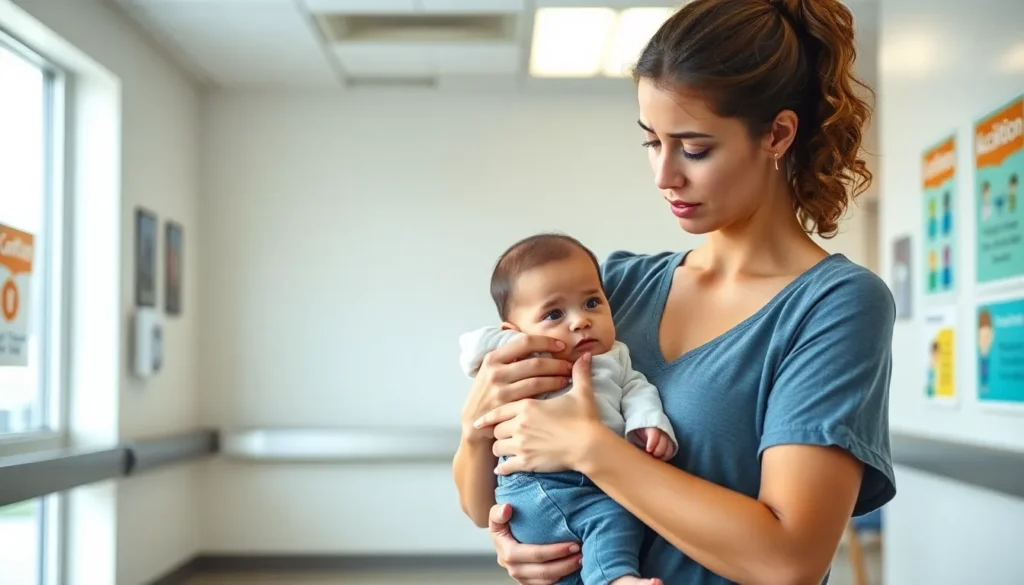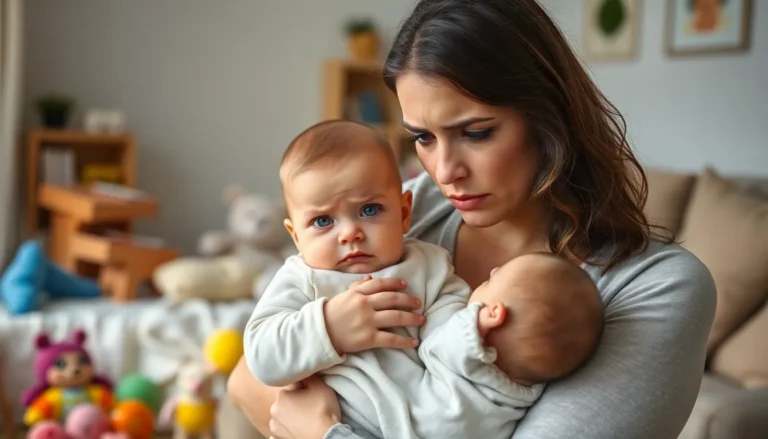Measles might sound like a character from a bad sitcom, but it’s no laughing matter—especially for babies. With recent outbreaks making headlines, it’s crucial to understand the risks that this highly contagious virus poses to the youngest members of society. Babies aren’t just cute bundles of joy; they’re also vulnerable to serious health complications if they catch measles.
Table of Contents
ToggleUnderstanding Measles Outbreaks
Measles outbreaks pose significant health risks, especially to vulnerable populations like babies. Recognizing the characteristics of this disease plays a crucial role in preventing its spread.
What Is Measles?
Measles is a highly contagious viral infection caused by the measles virus. The virus spreads through respiratory droplets emitted when an infected person coughs or sneezes. Symptoms typically include high fever, cough, runny nose, and a distinctive rash that appears several days after the initial symptoms. Serious complications can occur, particularly among young children, including pneumonia and encephalitis. Vaccination remains the most effective prevention strategy, significantly reducing measles incidence worldwide.
Causes of Measles Outbreaks
Inadequate vaccination coverage fuels measles outbreaks. Communities with low immunization rates provide fertile ground for the virus to spread. Travelers returning from regions experiencing outbreaks can introduce the virus into unvaccinated populations. Misinformation about vaccine safety also contributes to decreased vaccination rates. Health organizations emphasize the need for increased awareness and education to combat these outbreaks effectively. Maintaining high levels of immunity ensures protection against measles and its associated complications.
Impact on Babies
Measles poses significant health risks to babies, making awareness crucial during outbreaks. Young children remain especially vulnerable due to their immature immune systems.
Health Risks for Infants
Infants face serious health complications from measles that can arise quickly. Pneumonia develops in about 1 in 20 infants, while acute encephalitis occurs in roughly 1 in 1,000 cases. Additionally, severe diarrhea can lead to dehydration, which poses further threats. Hospitalization rates increase due to these complications, emphasizing the need for vigilant care. Vaccination stands out as the best defense. Most recommendations highlight administering the measles, mumps, and rubella (MMR) vaccine at 12 to 15 months of age to protect against these threats.
Long-Term Effects
Measles can cause long-term effects that extend beyond immediate health complications. Subacute sclerosing panencephalitis (SSPE) is a rare but devastating neurological condition developing years after measles infection. Its occurrence in 4 to 11 per 100,000 cases illustrates the importance of prevention. Cognitive decline and physical disabilities may follow, resulting in a significant quality of life reduction. Tracking these long-term consequences highlights the necessity of vaccination efforts to safeguard infants’ health.
Prevention Strategies
Preventing measles outbreaks, especially among babies, requires focused efforts on vaccination and community education. Effective strategies enhance immunity and reduce the spread of the virus.
Vaccination Importance
Vaccination plays a crucial role in protecting infants from measles. The measles, mumps, and rubella (MMR) vaccine should be given between 12 and 15 months of age. Studies show that vaccination significantly lowers the risk of contracting measles. Approximately 95% of those vaccinated develop immunity. High vaccination rates within the community help protect infants who cannot receive the vaccine due to age or health conditions. Herd immunity emerges when a sufficient portion of the population is immunized, providing indirect protection for vulnerable individuals. Ensuring timely vaccinations for children maintains community health and prevents outbreaks.
Community Awareness and Education
Community awareness is vital in combatting measles outbreaks. Misinformation about vaccines contributes to hesitancy and low vaccination rates. Educating the public about the dangers of measles strengthens the commitment to immunization. Engaging community leaders fosters trust in vaccination programs. Hosting informational sessions allows parents to ask questions and address concerns about vaccine safety. Promoting accurate health information through various channels, such as social media and local events, enhances public knowledge. Targeted campaigns can increase vaccination uptake among hesitant parents, ultimately leading to healthier infants and reduced disease spread.
Recent Measles Outbreak Trends
Measles outbreaks display significant trends that affect public health, especially among babies. Tracking these trends provides a clearer understanding of the disease’s impact and the importance of immunization.
Statistics and Data Overview
In recent years, cases of measles surged due to insufficient vaccination rates. The Centers for Disease Control and Prevention (CDC) noted that in 2019, the U.S. reported 1,282 measles cases across 31 states. Significant declines in vaccination coverage have contributed to this resurgence, with some communities falling below the 95% threshold needed for herd immunity. Babies under the age of 12 months are particularly at risk, as they cannot receive the MMR vaccine until they reach the age of 12 months. High hospitalization rates occurred among infants, with roughly 1 in 20 developing pneumonia. Complications from measles remain a critical concern, underlining the need for increased vaccination efforts.
Notable Outbreaks
In 2023, outbreaks occurred in various states, causing alarm among health officials. For example, New York reported over 50 confirmed cases within a single community, primarily affecting unvaccinated children. Similarly, California experienced a cluster of 40 cases linked to a community with low vaccination rates. Public health responses focused on increasing vaccination efforts in these areas. Measles outbreaks also prompted local health departments to organize vaccination clinics targeting infants and children. Engaging the community becomes essential to curb misinformation and bolster vaccine acceptance, stressing the importance of protective measures for vulnerable populations, particularly babies.
Conclusion
Measles outbreaks pose a significant threat to the health of infants. With their developing immune systems they face severe complications that can lead to hospitalization and long-term effects. The importance of vaccination can’t be overstated as it serves as the primary defense against this highly contagious virus.
Raising community awareness and combating misinformation are essential steps in ensuring high vaccination rates. By prioritizing education and promoting vaccine acceptance parents can protect their children and contribute to the overall health of their communities. With focused efforts on vaccination and public engagement it’s possible to safeguard infants from the dangers of measles and reduce the risk of future outbreaks.





